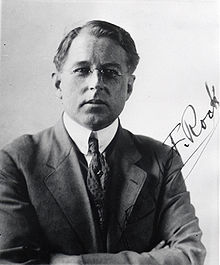約瑟夫·洛克
来自维基百科,自由的百科全书
約瑟夫·查爾斯·弗朗西斯·洛克(Joseph Francis Charles Rock,1884年1月13日—1962年12月5日),美籍奧地利探險家、植物學家、地理學家和語言學家[1]。曾於20世紀初,以美國《國家地理雜誌》、美國農業部、哈佛大學植物研究所的探險家,撰稿人、攝影家的身份到雲南滇緬邊境以及西藏考察。
生平
1884年生於奧地利維也納,1907年移居美國夏威夷檀香山,並在此成為植物群落專家。1911年進入夏威夷大學,主要從事植物學研究工作,建立了當地第一所植物標本館,並在1911-1920年間擔任館長。1913年獲得美國國籍[2]。
洛克的植物探索旅程啟航於泰國、緬甸和印度阿薩姆地區,最初旨在找尋大風子樹[4]。從1922年到1949年,「植物獵人」洛克在中國雲南、四川、甘肅東南以及西藏東部度過了漫長的探險考察歲月,對當地植物群落、人文風俗等多個方面進行了深入考察,並將多種植物樣本帶回西方,今天位於波士頓南部的阿諾德植物園保留了許多這一時期採集的植物樣本。
此後,洛克以麗江附近的村落為基地,對當地風土人情和動植物都進行了考察研究。這一時期的許多文章,都刊於國家地理雜誌上。也正是這一時期的文章,激發了作家詹姆斯·希爾頓的創作靈感,完成了著名小說《消失的地平線》,成就了香格里拉的美麗傳說。
2009年3月,夏威夷大學將其植物標本館命名為洛克館,以示紀念。[3]
著作
洛克在《美國國家地理》上發表的文章(發表時間為序):
- "Banishing the Devil of Disease Among the Nashi: Weird Ceremonies Performed by an Aboriginal Tribe in the Heart of Yunnan Province" (1924) 46:473-499
- "Land of the Yellow Lama: National Geographic Society Explorer Visits the Strange Kingdom of Muli, Beyond the Likiang Snow Range of Yunnan, China" (1924) 47: 447-491
- "Experiences of a Lone Geographer: An American Agricultural Explorer Makes His Way through Brigand-Infested Central China En Route to the Amne Machin Range, Tibet" (1925) 48: 331-347
- "Through the Great River Trenches of Asia: National Geographic Society Explorer Follows the Yangtze, Mekong, and Salwin Through Mighty Gorges" (1926) 50: 133-186
- "Life among the Lamas of Choni: Describing the Mystery Plays and Butter Festival in the Monastery of an Almost Unknown Tibetan Principality in Kansu Province, China" (1928): 569-619
- "Seeking the Mountains of Mystery: An Expedition on the China-Tibet Frontier to the Unexplored Amnyi Machen range, One of Whole Peaks Rivals Everest" (1930) 57:131-185
- "Glories of the Minya Konka: Magnificent Snow Peaks of the China-Tibetan Border are Photographed at Close Range by a National Geographic Society Expedition" (1930) 58:385-437
- "Konka Risumgongba, Holy Mountain of the Outlaws" (1931) 60:1-65
- "Sungmas, the Living Oracles of the Tibetan Church" (1935) 68:475-486
注釋
參見
外部連結
Wikiwand - on
Seamless Wikipedia browsing. On steroids.

